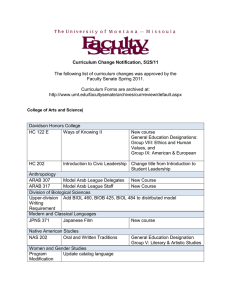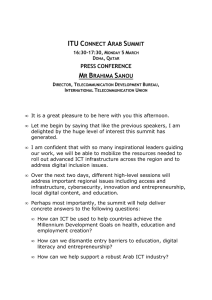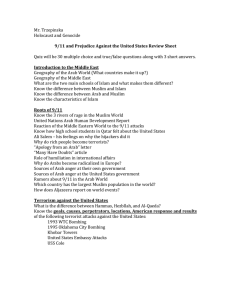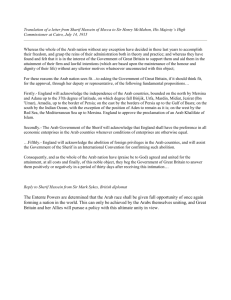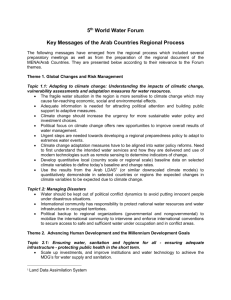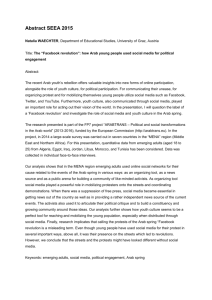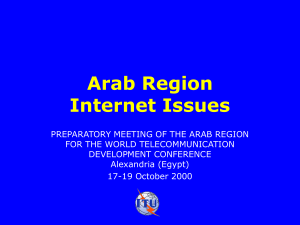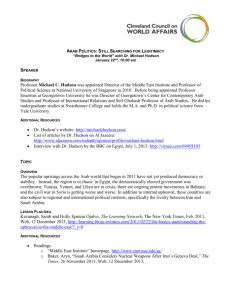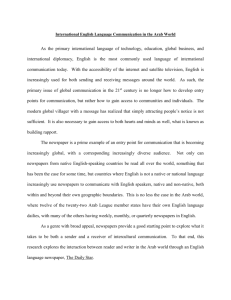AIDA - Southsouthworld.org
advertisement
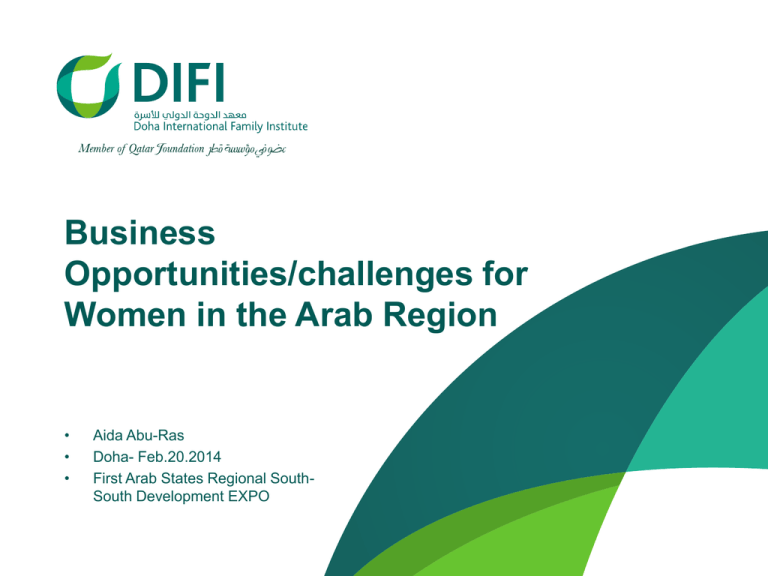
Business Opportunities/challenges for Women in the Arab Region • • • Aida Abu-Ras Doha- Feb.20.2014 First Arab States Regional SouthSouth Development EXPO • Outline: Definition: Business Women. Women Entrepreneurs Evolution of Entrepreneurship Opportunities Challenges Policy Recommendations • Business Women- Definition A woman who works in business especially in a high position. A woman who is good at dealing with business and financial matters (Merriam Webster Dictionary). A woman who works in business, especially one who has a high position in a company. (Cambridge Dictionaries on line) Businesswoman is a description for a woman entrepreneur who particular undertakes business activities for the purposes of generating revenue. She does this by combining her human ability and financial or physical capital to attain her business goals. • www.ask.com • Women Entrepreneurs • An entrepreneur is a person who has possession of a new enterprise, venture or idea and is accountable for the inherent risks and the outcome. The term was originally a loanword from French and was first defined by the Irish-French economist Richard Cantillon. • “An enterprise owned and controlled by a women having a minimum financial interest of 51 per cent of the capital and giving at least 51 per cent of the employment generated by the enterprise to women.” Government of India • Evolution of Entrepreneurship • In the 1980s, the Gender and Development approach (GAD), influenced by social feminism, post-modern and post-colonial theories, took into account the totality of women's lives, rejecting the public/private dichotomy which serves to devalue women's work at home. Focus on women's perspectives on development makes women the “subjects” rather than “objects” of development, change agents rather than welfare recipients. The GAD approach works to move women from the margin to the center by allowing them to gain a sense of control over their lives (empowerment). • Source: OECD • Opportunities • Percentage of educated women in the Arab region is high, although illiteracy rate in some country is still high (Yemen, Egypt, Iraq) • Availability of vocational training, although percentage of women enrolment is still low • Availability of resources • Percentage of youth is high in the Arab region • Political will, and commitments to implement international conventions (CEDWA) • Availability of programs for capacity building targeted women. (Donors’ Role) • Opportunities • NGOs and civil Societies are key players, and their mummers are increasing although in different structures and forms (some providing business incubators) • ICT revolution, where the number of people having internet access is increasing • National Women machineries/ ( strategies for women and family are in place in most of the Arab Countries • Policy reforms that is taking place in the region • Women are member of parliaments and municipalities • Challenges • Assets Acquisition : Spending on family welfare deprivation from their inheritance Access to loans and loaning terms and conditions, (i.e) holding property is a precondition to loans in most case. • Challenges • Mind set in the Arab region How women are perceived by the society How women perceive themselves • Challenges • Lack of confidence. Having accepted a subordinate status for long • Family burdens and responsibilities • Laws and regulations (family laws, tax, export and import) • opportunity identification and/or opportunity exploitation • lack of role models in entrepreneurship • Lack of experience • Lack of relevant networks and of societal position • Challenges • Availability of statistics: Informal sector Longitudinal data for having information about business development ,sustainability and growth • Marketing • Out reach of Existing business women net works • Access to internet and lack of experience in ICT • Insufficient technical skills in relation to packaging/storage of products • Conflict in the region • Policy Recommendations • • • • • Need to adopt Family Polices Revision of labor laws Revision of economic laws Revision of social security laws Mainstream gender in national development agendas/strategies( as a cross cutting issue)
